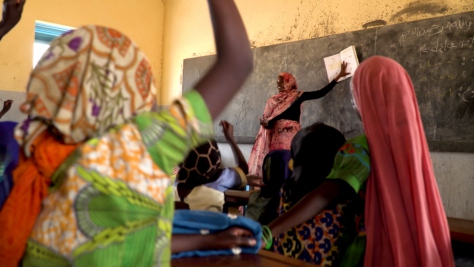16 Days Against Violence: UNHCR deeply disturbed by scale of violence against women
In 2012, some 12,000 incidents of sexual and gender-based violence were reported to UNHCR around the world, but many more cases never come forward.

Syrian refugee children attend a class in the Bekaa Valley, Lebanon. UNHCR chief António Guterres says humanitarian crises, like the conflict in Syria and Typhoon Haiyan in the Philippines, disproportionately affect children and adolescents and make them vulnerable. © UNHCR/S.Baldwin
GENEVA, November 25 (UNHCR) - UN High Commissioner for Refugees António Guterres said on Monday that the scale of sexual and gender-based violence was "deeply disturbing" despite the efforts of UNHCR and its partners to counter the "heinous" human rights abuse.
"In 2012, some 12,000 incidents were reported to UNHCR, but many more cases never come forward," Guterres said in a message to staff to mark the start of the annual 16 Days of Activism against Sexual and Gender-Based Violence.
He said that under this year's theme, "Safety in School," UNHCR aims to bring together boys and girls, teachers, parents, communities and partners to find durable and community-based solutions to prevent sexual and gender-based violence (SGBV) in school.
Guterres noted that humanitarian crises, like the conflict in Syria and Typhoon Haiyan in the Philippines, disproportionately affect children and adolescents. "Loss of family members, homes and ultimately futures, but also pre-existing gender inequalities and disruption of protective systems make boys, girls and youth extremely vulnerable to sexual and gender-based violence," he stressed.
The High Commissioner added that an estimated 60 million girls around the world are sexually assaulted on their way to school every year. Many boys and girls also face such violence in their classrooms and playgrounds. "This heinous human rights violation also carries significant human, social, and economic costs to our societies," he said.
"Recognizing the multi-faceted risks of SGBV that children and adolescents face, and the protective role education can play, UNHCR has focused in 2013 on integrating its strategies in the three core protection areas of SGBV, child protection and education," he explained. "Many operations are already developing mutually reinforcing programmes to protect girls and boys of concern from SGBV in school settings."
Guterres pledged that UNHCR, working closely with local partners and national authorities, would scale-up efforts to ensure safe learning environments, including through parent-teacher associations, youth clubs, extracurricular activities, the enforcement of codes of conduct, and confidential referral mechanisms for students to access health and psychosocial services.
"We know that by adopting a gender-sensitive approach to multisectoral services, for example by building separate latrines in schools or promoting the recruitment of female teachers among other measures, we can make girls and boys safer in school," he said.
Guterres noted that 148 UNHCR offices were implementing SGBV prevention and response programmes this year, making SGBV one of the highest selected objectives in country plans. But he added that safe learning environments "remain an under-programmed area in UNHCR operations."
UNHCR offices across the world, including the refugee agency's headquarters in Geneva, are holding events to mark the 16 Days of Activism and today's International Day to Eliminate Violence Against Women. For example, in addition to organizing cultural activities such as dancing, the UNHCR team in Burundi has also launched SGBV-related quizzes in schools as well as performances by teachers and students. Their objective is to focus on youth in order to help them understand how to prevent SGBV in schools, how to change behaviour in the long term to be more respectful of girls and women.
The 16 Days of Activism is an international campaign originating from the first Women's Global Leadership Institute in 1991. The 16 Days of Activism will run through to International Human Rights Day on December 10. It brings together UNHCR, partners, persons of concern and host communities worldwide in a united call to end sexual and gender-based violence in all its forms.
-

Municipalities Toolkit Flyer - Macedonian
13 Sep 2022 -

Sir Lewis Hamilton backs UNHCR's campaign on refugee education
13 Sep 2022 -

Sudanese refugees in Chad face challenges to deliver education
12 Sep 2022 Faced with an influx of refugees from Sudan to eastern Chad, UNHCR and its partners are providing vital support for the education of refugee children. -

Sudanese refugees and their hosts in Chad face challenges to deliver education
12 Sep 2022 -

UNHCR Education Report 2022 - All Inclusive The Campaign for Refugee Education
12 Sep 2022 The 2022 UNHCR Refugee Education Report draws on data from more than 40 countries across the world, enabling UNHCR to paint the clearest picture yet of the state of refugee education – and illustrate how refugee children and youth are falling behind their non-refugee peers when it comes to access to an inclusive quality education. -

Annotated provisional agenda
12 Sep 2022 -

Nearly 100,000 refugee arrivals in Uganda face a silent emergency, enormous needs
9 Sep 2022 -

Media page for 'All inclusive: The Campaign for Refugee Education' report
The 2022 UNHCR Refugee Education Report is titled All Inclusive: The Campaign for Refugee Education. It tells the stories of some of the more than 10 million refugee children of school age under UNHCR's mandate. It also highlights the aspirations of refugee youth eager to continue learning after secondary level, as well as the hopes and ambitions of teachers in refugee and host communities. -

Netflix brings Yusra Mardini's inspiring story to the world
9 Sep 2022 UNHCR Goodwill Ambassador hopes the dramatic new film of her and her sister's escape from conflict to new lives in Europe will challenge attitudes towards refugees.
